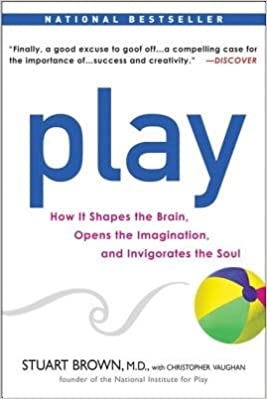What does play mean to you?
When was the last time you did something just for the fun of it?
When do you feel most light-hearted?
Have you noticed if you are more attracted to funny people?
Do you like to crack jokes?
Is fun-loving verbal play part of your day?
In Dr. Stuart Brown's wonderful book, Play: How it Shapes the Brain, Opens the Imagination, and Invigorates the Soul, I read the following:
“…the opposite of play is not work—the opposite of play is depression.”
And it was a Eureka! moment for me. It makes perfect sense, but for reasons I can not explain I had not thought of it that way before.
I know when I feel sad or depressed about something or someone, joking around, being lighthearted, silly, or even laughing is far from my mind. I’m sure you can think of times when you have felt down or when you were around people who have been “down in the dumps”, as my mom used to say, and joking was not part of the scene.
When our mood is low, when we are in despair or intense pain, playfulness and play are the first things to go.
But why?
According to Dr. Brown, play is an activity that signals health and vitality. Not just physical health, but mental health, too. When you look at play in the animal kingdom, researchers believe it is most likely done so animals can test the waters of a situation, relationship, or skill set. They do it to signal friendliness and sociability. However, those who are injured or scared do not feel like “testing the waters” so they hide away from other animals.

We, humans, hide away as well when we are ill or injured. Additionally, our capacity to engage verbally and emotionally is significantly reduced. For instance, we may stop smiling, talking, and participating in activities we once enjoyed. For some, it can even be difficult to get out of bed because life feels bleak and lackluster…there’s zero room for play in that state of mind. Depression literally depresses action and, therefore, activities (physical or mental) that usually bring about joy, laughter, and connection.
I want to highlight the mental health aspect here. Playfulness is a really good indicator of mental well-being. Why? Because it signals a desire to connect, to socially engage, and to have fun. Even someone who is physically unwell, a cancer patient or someone with a long-term illness, for example, can still crack a joke or poke fun at a situation. In this instance, they are saying, “I’m mentally OK. I want to connect with you.”
So, if you have a loved one who complains regularly or who can just not seem to find joy in life, find out how and what they like to play and do that! You may notice that their eyes light up and they soften to the possibility of joyfulness.
The Neuroscience of Play
The truth is that play seems to be one of the most advanced methods nature has invented to allow a complex brain to create itself. -Stuart Brown, M.D.
Research has shown that the absence of play in childhood is a factor in predicting criminal behavior. Those who engage in healthy play, on the other hand, learn necessary pro-social behaviors like setting boundaries for themselves and respecting the boundaries of others. Play builds neural connections through trial and error, testing physical limits, strengths, skills, and innate talents. It also enriches the mind with creative ideas through imaginative and pretend play. Additionally, it has been shown that abused children who are at risk for violent behavior reduce antisocial behavior when they are able to freely play.
What is going on here? Why is play so powerful?
According to a neural scientist, Gerald Edelman, the act of playing opens us up to a variety of experiences where we combine our imagination with reality. In doing so, we create maps in our minds which help us understand how the world works. This is vital in childhood because it allows our brains to make connections.
The genius of play is that, in playing, we create imaginative new cognitive combinations. And in creating those novel combinations, we find what works.
Is it fair to say that those who miss out on healthy, continuous, interactive play with others lose opportunities to build skills necessary to live a life of well-being? Possibly. More research in rats has shown that while solitary play can increase brain growth, whole-brain growth happens when play is done interactively, with different rats, and in a variety of settings. It is active play, not passive, i.e. soaking up surroundings, that impacts development.
Playfulness in Adults
While we generally think of children and childhood when we hear the word play, it is imperative that we maintain a connection to playfulness as adults as well. Dr. Brown says:
Play seems to be so important to our development and survival that the impulse to play has become a biological drive. Like our desires for food, sleep, or sex, the impulse to play is internally generated.
As mentioned earlier, when we are danger, play disappears. However, if we are feeling rested and fed, play happens spontaneously. For adults, those who go long stretches without some sort of play, focusing too much on the demands of life and setting aside play as “childish” can lose a sense of positivity or optimism. There’s evidence to suggest that like a sleep deficit, one can also experience a play deficit. When play is reintroduced there’s a desire to engage in play more. This would point to the innate drive to embrace activities that are new, interesting, unpredictable, and fun!
Sometimes, adults engage in activities that may look like play, but it isn’t the activity itself, it is a state of mind. For instance, if you golf with others because you are trying to sell something or create business connections, you are being calculated and controlled. The definition of play is:
“an absorbing, apparently purposeless activity that provides enjoyment and a suspension of self-consciousness and sense of time. It is also self-motivating and makes you want to do it again.”
It’s possible that while golfing for business was your original intention, playfulness crept in and you ended up thoroughly enjoying yourself. When we sync up with others through shared emotions or ideas, we may let our guard down and allow ourselves to lean into the moment more. This is why the activity sometimes creates the state of mind (for play) versus the other way around.
So, remember that the next time your child says, “play with me”. You may not feel like it because you have many things to do, but that action, accepting your child’s invitation can induce playfulness. And it’s not only good for them to see you living in the moment and saying yes to spontaneous play, it is good for you as well. Maybe your logical concerns for the future or noticeably increased pessimism will pivot towards optimism and creative solutions when you say "yes” to play. And if that doesn’t convince you, maybe this will:
Many studies have demonstrated that people who continue to play games, who continue to explore and learn throughout life, are not only much less prone to dementia and other neurological problems, but are also less likely to get heart disease and other afflictions that seem like they have nothing to do with the brain.
Children really do invite us to be healthy and to live, don’t they?
Grab your copy of Dr. Stuart’s awesome book for more insights, including the different types of play personalities. I’m a mix between The Explorer and The Artist/Creator with a dash of The Competitor thrown in for good measure. I’d love to hear what you are. Let us know in the comments.
Last, but not least!
Come join me, starting this month, on the newly created and long time in the making, The Barefoot Playground! Here we will play with ideas, topics, and research. We will support one another, laugh, explore, and test ourselves all while strengthening our minds and hearts in service of raising emotionally healthy kids.
Since many of us can’t be together in person, I have made it possible for us to be together in an interactive virtual space. Come one time a month or twice. Start and stop as you need. No long term commitment required.
See you on the Playground!
Missy



